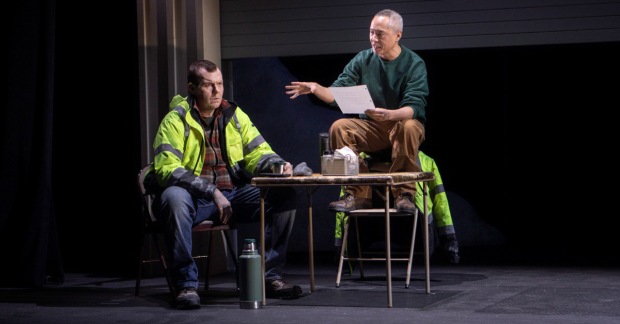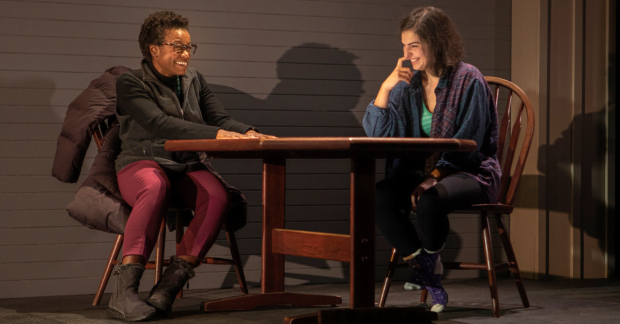Review: The World Is Out to Get Us in Will Arbery's Evanston Salt Costs Climbing
The New Group brings Arbery’s latest play to the Pershing Square Signature Center.

(© Monique Carboni)
Lately it's not hard to feel like the world may be somehow falling apart, perhaps even that there's some force of nature, like the weather, that's actually trying to get rid of us. If thoughts like that have crossed your mind, you'll find lots in common with the four characters in Will Arbery's mixed bag of a new play, Evanston Salt Costs Climbing, now running in a New Group production at the Pershing Square Signature Center. Set in Evanston, Illinois, where the winters can be brutal, it's not just the price of road salt that's rising — it's everyone's anxiety. Anxiety about what though? It's hard to say.
We never get a clear-cut answer in this teasingly existential comedy-drama, which becomes more abstruse as it goes on over the course of 100 minutes. That should come as no surprise to anyone who has seen Arbery's previous works, such as the gauzy Corsicana or the brilliantly subversive Heroes of the Fourth Turning. Arbery doesn't need to tell us what nameless terror is on the minds of his two snowplow drivers as they get ready to go out to clear the roads in 2014, the year a "polar vortex" plunged much of the country into dangerous cold. On some level, we already know.
Director Danya Taymor effectively dangles this mystery in front of us as we get to know Basil (Ken Leung), who has left a troubled past behind in his native Greece and occupies himself now writing fiction, and Peter (Jeb Kreager), a husband and father who has troubling bouts of suicidal ideation and an overall belief that the world would be better off without people in it. Both seem like misfits in their own lives, grown men who are stuck between their youth and the frightening prospect of becoming solidly middle-aged. They engage in light-hearted banter and hurl fuck-yous at each other like kids in a snowball fight before they head into the icy air to plow the snow (a large garage door opens in Matt Saunders's imposing warehouse of a set to reveal the men huddled in the cabin of their cramped truck).
Watching over them like a zealous high school teacher is their buoyant yet troubled boss, assistant director of Public Works Jane Maiworm (the terrific Quincy Tyler Bernstine). She's thinking about the cost-effectiveness of installing heating tiles beneath the roads of Evanston, an undertaking that would reduce the city's need for snow-melting salt (whose costs, as she and the title tell us, are climbing).

(© Monique Carboni)
But that could also put Basil and Peter out of a job one day. Her anxiety is exacerbated by a feeling that, like salt, tearing up the roads would be somehow bad for the environment, flying in the face of her idol Jane Jacobs, the famously outspoken critic of "urban renewal." Hasn't all the salt damaged the planet and the nearby rabbit populations enough? "That's what happens to bunnies in the winter," Maiworm says with a sigh. "They eat salt and die confused."
Bernstine delivers this line in a matter-of-fact way that gets a round laugh from the audience — and that kind of deadpan humor helps keep Evanston Salt Costs Climbing from sinking under its own apocalyptic weight. Added to that are some surreal touches that lend mystery to the mundane, such as the strange appearance of a woman in a purple hat (costumes by Sarafina Bush), who we learn early on is a terrifying figure in a recurring dream of Basil's. This ghostly manifestation, chillingly silhouetted by Isabella Byrd's haunting lighting and made almost supernatural by Mikaal Sulaiman's eerie sound design, has the effect of a raven perched above our chamber door, presaging some silent malevolence that has come to exact a reckoning.
Such surrealistic effects can be taken too far though, and that's what happens late in the play. Arbery began writing this piece while he was an MFA student at Evanston's Northwestern University, and much of the play's 11th-hour pyrotechnics have the whiff of a grad school workshop. By the end, we feel almost as though we're in a different play altogether as a character mysteriously disappears and we witness fantastical twists of plot that might have seemed ingenious on paper but that don't fare well onstage.
On the bright side, Arbery's quirky characters never lose their humanity. Rachel Sachnoff, who plays Maiworm's nervous stepdaughter with delightful abandon, provides laughs near the end that remind us of the reasons we're intrigued by them. "Um," she asks Peter, "do you think there's something underneath everything that wants us to die?" "One hundred percent," says Peter, "I know it to be true." "OK cool. OK thanks," she responds. She seems absolutely relieved, and we understand why. If we're all freaking out about the state of the world right now, at least we're not doing it alone.









